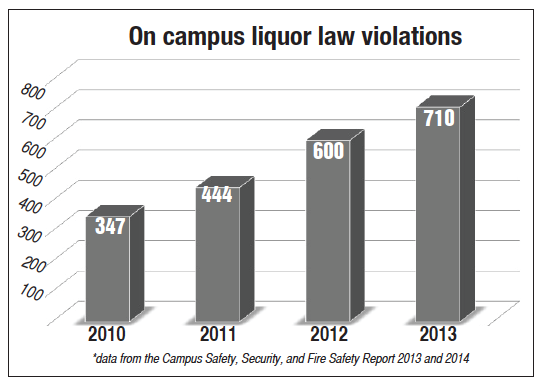The Good Samaritan Policy, currently a work in progress among the university and the University of Arizona Police Department, will protect students from disciplinary action who are seeking medical help for their intoxicated friends.
UAPD Police Chief Brian Seastone gave a description of what they hope the policy will look like.
“The procedure, if adopted, would provide those students who are underage and have been drinking with a one-time disciplinary [or] criminal exemption related to an alcohol offense,” Seastone said.
Seastone also said that students who are drinking while using illegal drugs will not qualify for the policy.
“My main concern is that a person who is caring for someone or needs to call for emergency assistance or report a crime can do so without fear of the being cited or diverted for being a minor in possession,” Seastone said.
Kendal Washington White, assistant vice president for student affairs and deans of students, said protocols such as Good Samaritan and Medical Amnesty have been taken up by other colleges and universities attempting to help students — who fear that trying to get help while they or their friends are intoxicated could cause them to violate alcohol laws and their universities’ codes of conduct.
“In other words, if an underage student is suffering the physical symptoms of extreme intoxication, that individual’s underage friends, who have also been drinking, may recognize that the student needs medical attention, but are hesitant to call for assistance,” White said.
White said good samaritans have been recognized by the Dean of Students Office in the Student Code of Conduct. White said the office has not issued the normal punishments for these students who attempted to do the right thing.
Melissa Vito, senior vice president for student affairs and enrollment management, said there is a fundamental difference between the Good Samaritan Policy and the Associated Students of the University of Arizona’s SafeRide program. SafeRide, Vito said, is a service provided by ASUA that gives students rides to ensure their safety for other reasons, such as returning to a residence hall late at night for non-alcohol related reasons.
SafeRide is different from the proposed Good Samaritan Policy, because it allows students who might be too afraid or nervous to seek help the opportunity they need for their safety or the safety of their friend, Vito said. She said with the knowledge that those who may have been drinking underage won’t face any disciplinary action creates a more open environment for students’ safety.
“Life safety is always the priority,” Seastone said.
_______________
Follow Ariella Noth on Twitter.









